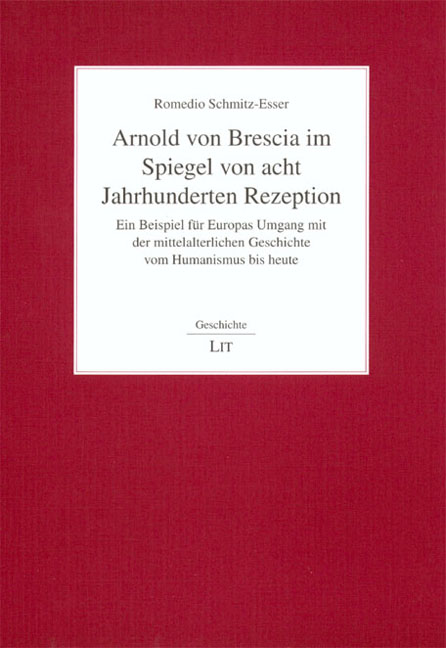Prof. Dr. Romedio Schmitz-Esser
|
|
Contact romedio.schmitz-esser@zegk.uni-heidelberg.de +49 (0)6221-54-2293 Historisches Seminar 2nd floor, room 148 Grabengasse 3-5 69117 Heidelberg |
Office Hours
Tuesday 3pm – 4pm by appointment
Education
|
2013 |
Habil. |
Ludwig-Maximilians-University of Munich |
|
2005 |
Dr. phil. |
Leopold-Franzens-University of Innsbruck |
|
2002 |
Mag. phil. |
Leopold-Franzens-University of Innsbruck |
Employment
|
2020- |
Professor of Medieval History (Later Middle Ages) Ruprecht-Karls-University of Heidelberg |
|
2017-2020 |
Professor of Medieval History and the Auxiliary Sciences of History Karl-Franzens-University of Graz |
|
2014-2016 |
Director |
|
2008-2014 |
Lecturer Ludwig-Maximilians-University of Munich |
|
2011-2012 |
Feodor-Lynen-Fellow of the Alexander von Humboldt Foundation Duke University |
|
2005-2008 |
City Historian Urban Commune of Hall in Tirol |
|
2004 |
Fellow Austrian Historical Institut in Rome |
|
2002- |
Researcher in the project „The German inscriptions“ (Vienna Series) Austrian Academy of Sciences |
Romedio Schmitz-Esser, born in 1978 in Hamburg, studied history and art history in Innsbruck. In 2005, he completed a dissertation on the reception of the schismatic Arnold of Brescia under the supervision of Josef Riedmann. As city historian of Hall in Tirol, he led its city archive from 2005 to 2008 and in addition curated the city museum. In 2008, he moved to the Ludwig-Maximilians-University of Munich as assistant of Prof. Knut Görich. While at the Ludwig-Maximilians-University of Munich he received scholarships from the Fritz Thyssen Foundation for research stays in London and Paris, spent one year as a Feodor-Lynen-Fellow at Duke University in North Carolina/USA, visited Jinan University in Guangzhou/VR China as a short-time lecturer and completed his habilitation project on the history of the corpse in the Middle Ages. He then served as Director at the German Study Center in Venice from 2014 to 2016, where he established "kinesis - città e movimento" - a thematic research focus spanning the arts and the humanities; concurrently, he was visiting researcher at Università Ca' Foscari in Venice. In 2017, he became Professor of Medieval History and the Auxiliary Sciences of History at the Karl-Franzens-University of Graz and served as head of the Institute of History. In 2018, he received a proactive offer for a W3 professorship in "Cultural Management" with a focus on "Cultural Heritage" at the Brandenburg University of Technology Cottbus-Senftenberg (declined). In 2020, he was appointed to the chair for medieval history with a focus of the late Middle Ages at Ruperto Carola, Ruprecht-Karls-University of Heidelberg.
Romedio Schmitz-Esser is a member of the boards of trustees of the Gesellschaft für staufische Geschichte e.V. and the Barbarossa Foundation Altenburg. He is also a member of the project committee "Deutsche Inschriften des Mittelalters und der Frühen Neuzeit" at the Bavarian Academy of Sciences as well as co-editor of the series "Forum historische Forschung: Mittelalter" (Kohlhammer) and the series "Beihefte zur Mediaevistik" (Lang) and the series "Venetiana" (Viella) from 2014 to 2017. In addition, he was co-founder of "Forum Hall in Tirol. Neues zur Geschichte der Stadt". He is a member of the scientific advisory committee of "Mediaevistik" and a peer reviewer for the journal "MEMO – Medieval and Early Modern Material Culture Online". His research interests include history of art and mentalities, the material culture and epigraphy of the Middle Ages, regional history of the later Middle Ages, the history of Italy, and reception studies. He is currently working on a monograph about the exchange between East Asia and Europe ("The Buddha and the Medieval West").
Selected publications
 |
Um 1500. Europa zur Zeit Albrecht Dürers, Darmstadt 2023. |
| The Corpse in the Middle Ages: Embalming, Cremating, and the Cultural Construction of the Dead Body, London/Turnhout 2021. | |
|
|
Handgebrauch. Geschichten von der Hand aus dem Mittelalter und der Frühen Neuzeit, hrsg. gem. mit Robert Jütte, Paderborn 2019. |
|
|
|
|
|
Venezia nel contesto globale. Venedig im globalen Kontext (Venetiana 20), hrsg. Romedio Schmitz-Esser, Rom 2018. |
|
|
|
|
|
Der Leichnam im Mittelalter. Einbalsamierung, Verbrennung und die kulturelle Konstruktion des toten Körpers (Mittelalter-Forschungen 48), 2. Aufl., Ostfildern 2016. |
|
|
|
|
|
Die Inschriften der Politischen Bezirke Imst, Landeck und Reutte (Die Deutschen Inschriften 82: Die Inschriften des Bundeslandes Tirol 1), hrsg. gem. mit Werner Köfler, Wien 2013. |
|
|
|
|
|
Arnold von Brescia im Spiegel von acht Jahrhunderten Rezeption. Ein Beispiel für Europas Umgang mit der mittelalterlichen Geschichte vom Humanismus bis heute (LIT Geschichte 74), Wien–Berlin–Münster 2007. |




